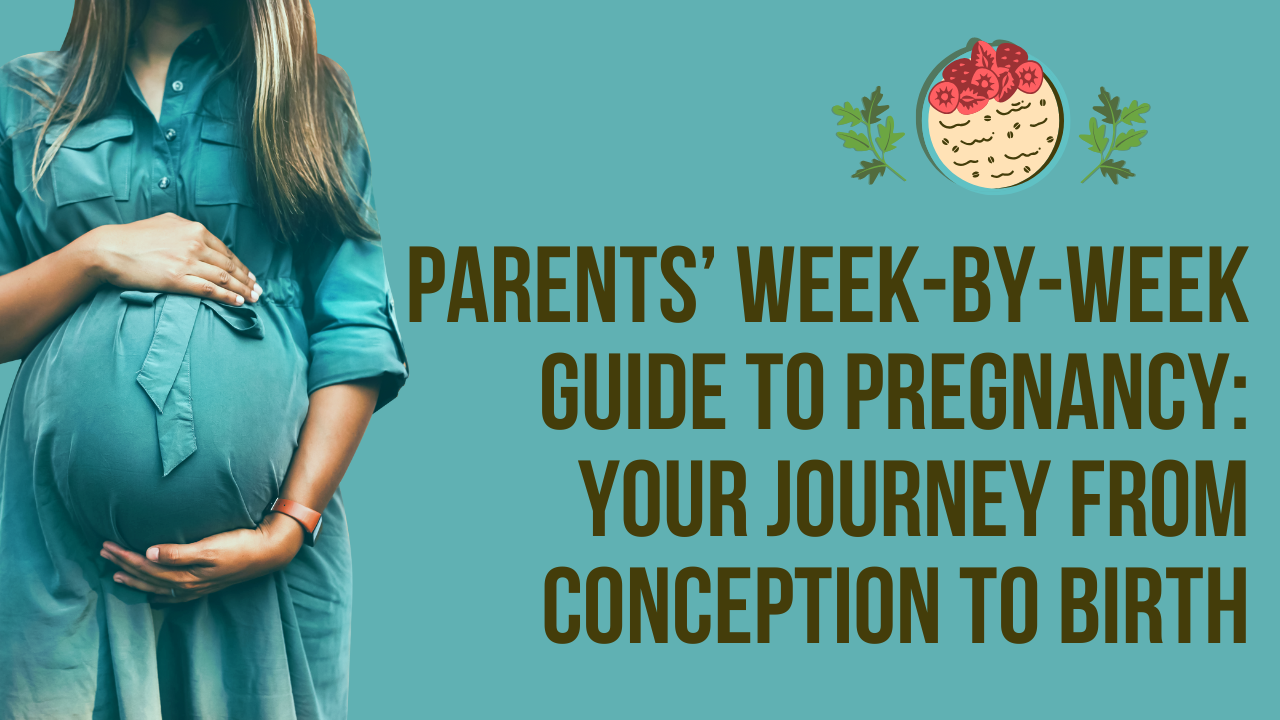Parents’ Week-by-Week Guide to Pregnancy: Your Journey from Conception to Birth
This week-by-week guide to pregnancy provides expectant parents with detailed insights, tips, and support as they navigate each stage, from conception to birth, focusing on the mother's physical and emotional journey. It offers empathetic advice to ensure a healthy and positive experience for both mother and baby.
Pregnancy is an extraordinary journey filled with excitement, anticipation, and sometimes a bit of anxiety. From the moment you discover you’re expecting, your body begins an incredible transformation. Each week brings new developments, both for your growing baby and your own body. This week-by-week guide will walk you through the stages of pregnancy, offering insights, tips, and a bit of reassurance for the incredible journey ahead.
Weeks 1-4: The Beginning of Your Journey
What’s Happening: In the first few weeks of pregnancy, things are just starting to unfold. Technically, pregnancy begins at the start of your last menstrual period (LMP). This may seem confusing, but it’s the method doctors use to calculate your due date. During this time, your body is preparing for the possibility of pregnancy. Ovulation occurs around the middle of your cycle, and if a sperm fertilizes the egg, conception happens.
Mom’s Experience: You might not even know you’re pregnant yet, but your body is already hard at work. Some women may experience early signs of pregnancy, such as fatigue, nausea, or a heightened sense of smell. Emotionally, this can be a time of mixed feelings—excitement, nervousness, and perhaps a little disbelief.
Tips:
- Take Prenatal Vitamins: Begin taking prenatal vitamins with folic acid to support your baby’s development and reduce the risk of neural tube defects.
- Healthy Habits: If you haven’t already, start adopting healthy habits like avoiding alcohol, smoking, and reducing caffeine intake.
Weeks 5-8: The Early Stages
What’s Happening: Around week 5, the tiny embryo is starting to form. By week 6, the heart begins to beat, and by week 8, all major organs are in the early stages of development. Your baby is now called a fetus and is growing rapidly, although still tiny—about the size of a raspberry.
Mom’s Experience: This period is when morning sickness often kicks in, though it can vary greatly. You might feel tired, emotional, and have tender breasts. These symptoms can be tough, but they’re signs that your body is doing everything it can to nurture your growing baby.
Tips:
- Managing Nausea: Eat small, frequent meals and keep crackers by your bedside to nibble on before getting up in the morning.
- Rest: Listen to your body and rest when you need to. Pregnancy can be exhausting, especially in the early weeks.
Weeks 9-12: The First Trimester Nears Its End
What’s Happening: Your baby is now developing more defined facial features, and the vital organs are continuing to grow. By the end of this trimester, your baby will have completed the most critical phase of development and will be about the size of a plum.
Mom’s Experience: As the first trimester comes to a close, you may start to feel a little more energized, although nausea can still linger. This is often when you’ll have your first prenatal visit, where you may get to hear your baby’s heartbeat—an unforgettable moment.
Tips:
- Stay Hydrated: Drink plenty of water to help reduce swelling and support increased blood volume.
- Prenatal Care: Schedule your first prenatal appointment if you haven’t already, and discuss any concerns with your healthcare provider.
Weeks 13-16: Welcome to the Second Trimester
What’s Happening: During this time, your baby’s body starts to catch up with the head, which was previously the largest part. Bones are hardening, and the tiny muscles are developing, which means your baby may start moving—although you might not feel it yet. By week 16, your baby is about the size of an avocado.
Mom’s Experience: Many women find the second trimester to be the most comfortable. Nausea often subsides, and you may notice a small baby bump starting to show. You might experience a surge in energy and find yourself excitedly planning for your baby’s arrival.
Tips:
- Balanced Diet: Focus on a balanced diet rich in fruits, vegetables, and lean proteins to support your baby’s growth.
- Exercise: Continue or start a moderate exercise routine, such as walking or prenatal yoga, to help with circulation and keep you feeling strong.
Weeks 17-20: Halfway There
What’s Happening: Your baby is now practicing breathing movements, and you may feel the first fluttering kicks, known as quickening. By week 20, your baby is about the size of a banana, and an ultrasound around this time can reveal the gender, if you choose to find out.
Mom’s Experience: This is an exciting time as you begin to feel your baby move. Your belly is becoming more prominent, and you might start to experience some common discomforts like back pain or leg cramps. Emotionally, you may feel a strong bond forming with your baby.
Tips:
- Sleeping Comfortably: Use a pregnancy pillow to support your growing belly and help you sleep more comfortably.
- Plan for the Future: Start thinking about your birth plan and consider attending childbirth classes to prepare for labor and delivery.
Weeks 21-24: The Baby’s Senses Develop
What’s Happening: Your baby’s senses are becoming more refined. They can hear your voice and might even respond to sounds by moving. The skin is still translucent but starting to fill out as fat develops. By week 24, your baby is about the size of an ear of corn.
Mom’s Experience: As your baby grows, so does your belly! You may notice stretch marks appearing and feel more frequent baby movements. It’s also common to experience Braxton Hicks contractions, which are your body’s way of preparing for labor.
Tips:
- Moisturize: Regularly moisturize your belly to help with itchy skin and minimize stretch marks.
- Stay Active: Continue exercising, focusing on low-impact activities that are safe during pregnancy, and consider pelvic floor exercises to prepare for labor.
Weeks 25-28: The End of the Second Trimester
What’s Happening: Your baby’s brain is growing rapidly, and they can open and close their eyes. The lungs are still developing, and your baby is gaining more weight. By the end of week 28, your baby is about the size of an eggplant.
Mom’s Experience: As you approach the third trimester, you might feel a mix of excitement and nervousness about the upcoming birth. You may experience some physical challenges like heartburn, swelling, or trouble sleeping. However, the thought of meeting your baby soon can make it all worthwhile.
Tips:
- Prepare for Baby: Start preparing your nursery and gathering essentials like baby clothes, diapers, and a car seat.
- Stay Hydrated: Drinking plenty of water can help with swelling and prevent dehydration.
Weeks 29-32: The Final Trimester Begins
What’s Happening: Your baby is now practicing breathing, sucking, and swallowing, all essential skills for life outside the womb. The bones are fully developed but still soft and pliable. By week 32, your baby is about the size of a squash.
Mom’s Experience: The third trimester can be physically demanding. You may feel more tired and uncomfortable as your baby takes up more space. However, this is also a time of intense anticipation as you prepare for the arrival of your little one.
Tips:
- Practice Relaxation: Incorporate relaxation techniques like deep breathing or meditation into your daily routine to manage stress.
- Discuss Birth Plan: Have a conversation with your healthcare provider about your birth plan, including pain management options and preferences for labor and delivery.
Weeks 33-36: Getting Ready for Birth
What’s Happening: Your baby is continuing to gain weight and store fat, which will help regulate their body temperature after birth. The lungs are nearly fully developed, and the baby is likely settling into a head-down position, ready for delivery. By week 36, your baby is about the size of a honeydew melon.
Mom’s Experience: As your due date approaches, you may experience more frequent Braxton Hicks contractions. Your belly may feel very heavy, and you might find it difficult to sleep. Emotionally, you could be feeling everything from excitement to anxiety as the big day nears.
Tips:
- Pack Your Hospital Bag: Prepare your hospital bag with essentials like comfortable clothes, toiletries, and items for the baby.
- Stay Calm: Try to relax and stay calm, knowing that you’ve prepared as much as possible for the arrival of your baby.
Weeks 37-40: The Final Countdown
What’s Happening: Your baby is considered full-term by week 37, which means they’re ready to be born at any time. The lungs are fully developed, and your baby is continuing to gain weight. By week 40, your baby is about the size of a watermelon and ready to meet you.
Mom’s Experience: This is it—the final stretch! You may feel a mix of impatience and excitement as you wait for labor to begin. Some women experience a burst of energy known as “nesting,” while others may feel more fatigued. Your body is preparing for labor, and you might start noticing signs like a “bloody show” or your water breaking.
Tips:
- Final Preparations: Make sure everything is ready for your baby’s arrival, including the nursery and any last-minute items you need.
- Listen to Your Body: Pay attention to the signs of labor and contact your healthcare provider when you think it’s time






